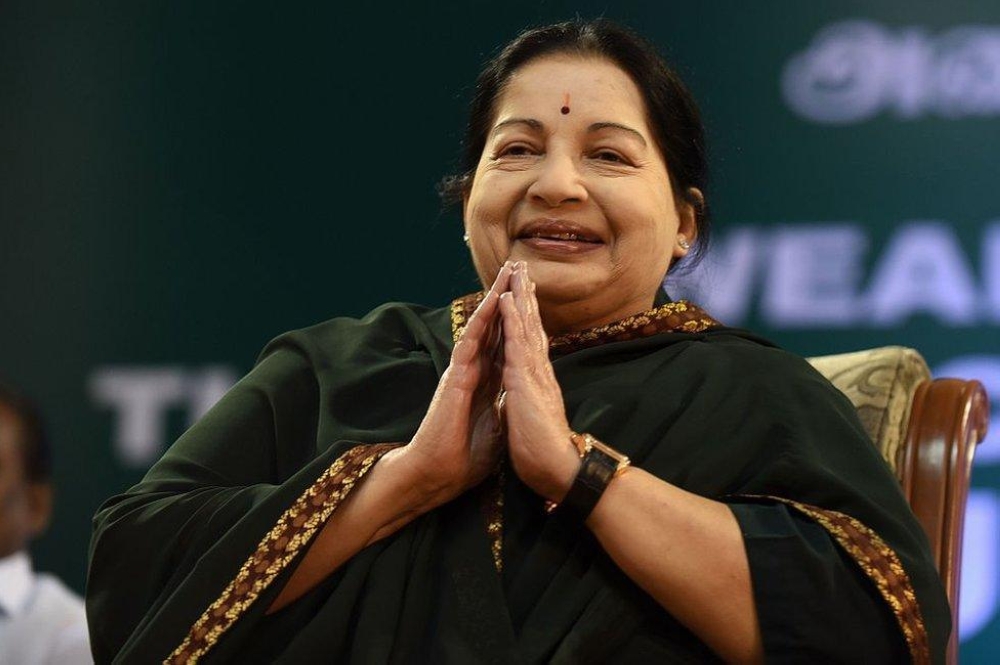AUGUST 31 —Jayaram Jayalalithaa (born February 24, 1948, died December 5, 2016) was an Indian film actress and politician who served as the leader of the All India Anna Dravida Munnetra Kazhagam (AIADMK).
She served a record six times (beginning in 1991) as chief minister of Tamil Nadu, a state in India, when the AIADMK swept the state assembly elections, heading a coalition government with the Indian National Congress (Congress Party). She was popularly known as Amma (Mother).
Considered as one of India’s most controversial and colourful politicians, Jayalalithaa’s career was marred by allegations of corruption.
During her first term as chief minister (1991–96), she reportedly acquired millions of dollars’ worth of properties, allegedly in a manner inconsistent with her known sources of income.
After the AIADMK lost the 1996 state assembly elections, about 40 corruption cases were filed against Jayalalithaa.
In 2014, in a case that lasted 18 years, she was found guilty of amassing unaccounted-for wealth and sentenced to jail for four years.
Her lawyers applied for a suspended sentence and bail pending appeal. The High Court judge refused her bail despite the prosecution not objecting to the bail application.
Justice AV Chandrashekara wrote in his ruling: “The honourable Supreme Court [of India in State of Maharashtra Tr. CBI v. Balakrishna Dattatrya Kumbhar (2012)] has held that corruption violates human rights … [The Supreme Court has] further held that systematic corruption is a violation of human rights as it leads to economic crisis.”

Jayaram Jayalalithaa was found guilty of amassing unaccounted-for wealth and sentenced to jail for four years. — AFP file pic
Articulating corruption as a human rights violation in 2012 was then a relatively new phenomenon.
While the long battle against corruption had then yielded a number of international legal and institutional initiatives – most notably the UN Convention Against Corruption (UNCAC) – in terms specifically of human rights, however, the response had not progressed “far beyond baseline analyses of the negative human rights impacts of corruption and calls for that much to be recognized in efforts designed to combat corruption.”
According to David Kinley (then Chair of Human Rights Law, Sydney University) what, in particular, was missing was concerted efforts to assess what precisely international human rights law could do to promote those efforts at combating corruption and what tangible added value a human rights approach might offer.
To supplement those efforts, Kinley proposed that a specific, freestanding human right combating corruption – that is, a “right to freedom from corruption” (RFFC) – be recognised at the level of international law.
Why the need for RFFC? Kinley argued that RFFC was needed “in order to recognise the importance of corruption; to appreciate its immensely corrosive impact on the very nature of the human rights project – namely, that all are equal in dignity and worthy of equal respect regardless of one’s position, power or wealth. A free-standing right highlights these essential qualities and focuses attention on states’ obligation to govern fairly, equitably and legally, and thereby to eliminate, or at least minimize, corruption.”
Another reason was that a discrete RFFC would assist in the broader human rights concern of bolstering governance – to enhance the capacity, efficiency and fairness of government.
By mandating states to recognize freedom from corruption as a human rights issue, a new and powerful normative dimension would be added to the argument for why states need to act against corruption, which was dominated by the concern to criminalise such conduct.
By pronouncing that corruption constitutes a systemic breach of a basic human right, the broader human rights concerns are made more emphatic.
A third reason propounded by Kinley was that such a focus on states’ human rights obligations to combat corruption would provide “a new foothold in the debate over the extent states must be required to make corporations responsible for their human rights abusing actions, both infra- and extra-territorially.”
Such a legally backed international human right would also provide leverage in persuading states to take more seriously their domestic efforts to combat corruption through enactment of appropriate legislation, where necessary, and its effective implementation and enforcement. (See David Kinley, “A New Human Right to Freedom From Corruption”, Sydney Law School, 2014)
After more than 10 years of articulation, perhaps it is ripe for the country to recognize RFFC.
Only then, as Prime Minister Anwar Ibrahim reportedly said, can the country’s true independence be achieved – that is, when it frees itself from corruption, smuggling, and cartels that have long weakened the nation.
*This is the personal opinion of the writer or publication and does not necessarily represent the views ofMalay Mail.






